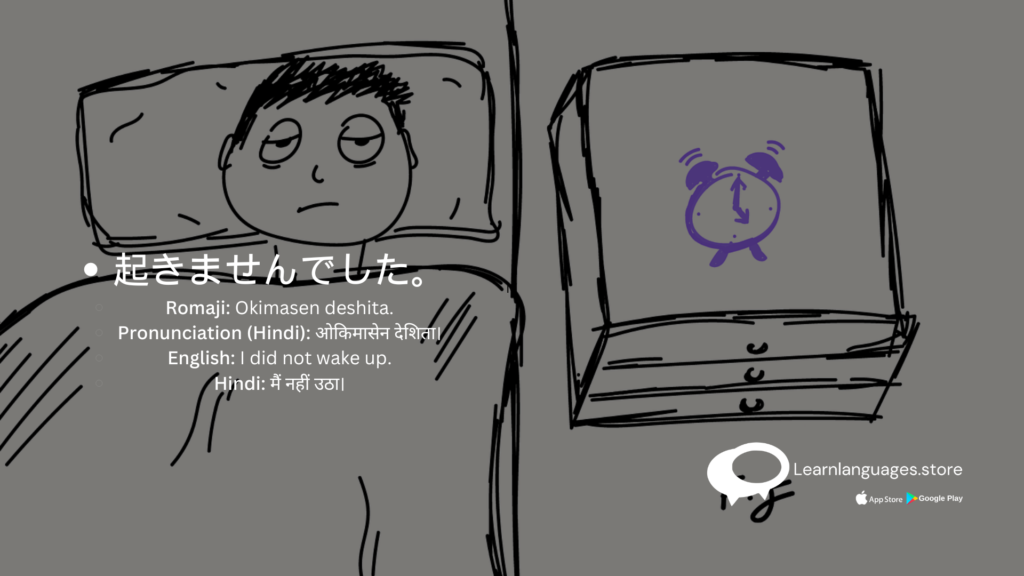Mastering ませんでした (Masen Deshita): The Polite Past Negative Form in Japanese
Mastering ませんでした (Masen Deshita): The Polite Past Negative Form in Japanese
Estimated reading time: 4 minutes

INTRODUCTION:
こんにちは (Konnichiwa) readers! Today, we’re diving into the world of Japanese grammar with a focus on the polite past negative form, ませんでした (masen deshita). Get ready for an engaging and humorous journey through this essential part of Japanese language learning.
Understanding ませんでした (Masen Deshita)
The verb ending ませんでした (masen deshita) is used to indicate that an action did not occur in the past, conveyed in a polite manner. This form is crucial for making polite past negative statements in Japanese.
Sentence Structure
The structure with ませんでした (masen deshita) typically follows this pattern:
[Verb Stem] + ませんでした
- English: [Verb] + ませんでした
- Japanese: [Verb Stem] + ませんでした
- Hindi: [क्रिया] + ませんでした
Examples
Let’s look at some examples to understand how ませんでした (masen deshita) is used in sentences.
- Expressing Past Negation:
- 食べませんでした。
- Romaji: Tabemasen deshita.
- Pronunciation (Hindi): ताबेमासेन देशिता।
- English: I did not eat.
- Hindi: मैंने नहीं खाया।
- 食べませんでした。
- Talking About Past Plans:
- 行きませんでした。
- Romaji: Ikimasen deshita.
- Pronunciation (Hindi): इकिमासेन देशिता।
- English: I did not go.
- Hindi: मैं नहीं गया।
- 行きませんでした。
Fun and Humorous Examples
Learning with humor makes it more memorable! Here are some funny scenarios involving ませんでした (masen deshita).
- The Sleepyhead’s Confession:
- 起きませんでした。
- Romaji: Okimasen deshita.
- Pronunciation (Hindi): ओकिमासेन देशिता।
- English: I did not wake up.
- Hindi: मैं नहीं उठा।
- 起きませんでした。
- The Great Exercise Escape:
- 運動しませんでした。
- Romaji: Undō shimasen deshita.
- Pronunciation (Hindi): उन्दो शिमासेन देशिता।
- English: I did not exercise.
- Hindi: मैंने व्यायाम नहीं किया।
- 運動しませんでした。
Identifying ませんでした (Masen Deshita) in a Sentence
Spotting ませんでした (masen deshita) in a sentence helps you understand its function. Here’s how you can identify it:
- Look for ませんでした (masen deshita) at the end of a verb.
- It indicates that the action did not occur, expressed politely and in the past tense.
For example:
- 昨日、映画を見ませんでした。 (Kinō, eiga o mimasen deshita.)
- In this sentence, “昨日” (kinō) means “yesterday,” “映画を” (eiga o) means “a movie,” and “見ませんでした” (mimasen deshita) means “did not watch.” The ませんでした (masen deshita) indicates the polite past negative form.
Conclusion
Congratulations! You’ve now mastered the Japanese verb ending ませんでした (masen deshita), a vital tool for expressing polite past negative actions. By understanding its usage in sentence structure and exploring humorous examples, you’ve taken a significant step forward in your journey to fluency in Japanese.
Remember, practice is key. Keep using ませんでした (masen deshita) to articulate what didn’t happen in the past, respectfully and accurately. Embrace the subtleties of polite language and enjoy the process of mastering Japanese grammar.
As you recount past events politely using ませんでした (masen deshita), may your language skills flourish, enabling you to communicate effectively and respectfully in Japanese.
Happy learning!
-
Product on sale
 Japanese N4
Japanese N4₹18,300.00
₹24,300.00 -
Product on sale
 Japanese N5
Japanese N5₹16,300.00
₹18,300.00
Learn Languages Store
Vashi,
Email: services@learnlanguages.store










